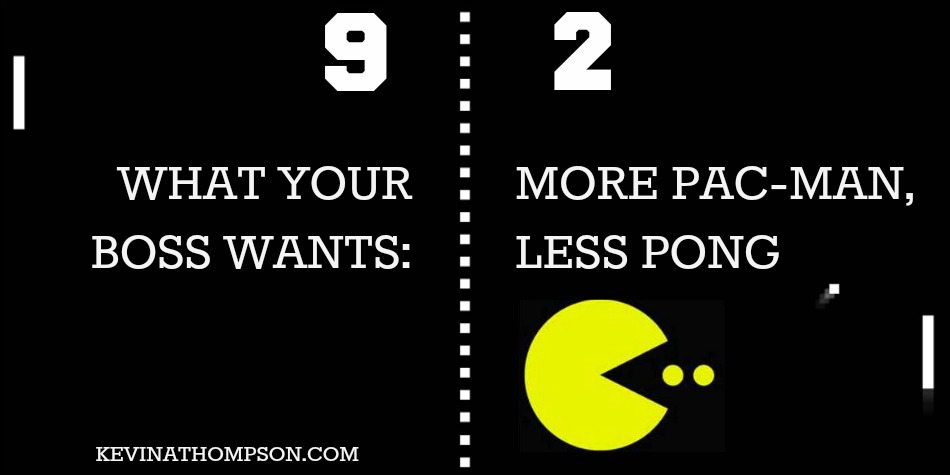I was nine or ten when a Nintendo console finally made it to my hometown. What my nine-year-old would find boring, mesmerized me and my friends for several years. But before the Nintendo, we had an Atari. We didn’t play it much because it wasn’t that exciting but when we did play, we had two games—Pong and Pac-Man.
When I think about what the average employer is looking for, I think back to my childhood. We need less Pong and more Pac-man.
Pong was a type of tennis game. You had control of a bar and your opponent on the other end of the screen had control of a bar. A ball bounced back and forth. The goal was to always hit the ball back at your opponent and hope they were unable to return the ball.
This describes the mentality of many modern workers. With a thousand responsibilities and little time, their number one goal is to bounce problems in another direction. Something arises and they direct it to a co-worker. The co-worker directs it back so they take it to their boss. The boss bounces the problem back so they pass it in a different direction. At all times they are bouncing problems in other directions.
Pac-man had a different concept. A grid was filled with pellets and the object was for Pac-man to eat all the pellets without being caught by one of the enemies. The goal was to eat all you could while avoiding the bad guys. (See: Why We Are Afraid to Change)
This should be the mindset of the modern worker. We get things done.
There is a time for pong. Leaders need to have a pong mentality when an employee presents a problem. We need to assist them, give them ideas, and empower them. We don’t need to take their problems from them; we need to bounce the problems they bring back to them while giving them a better ability to solve whatever issue they are having.
But most of the time we all need to be like Pac-man. We need to eat every problem that comes our way. Bouncing problems destroys efficiency; it wastes time; it causes us to spend more energy not solving problems than solving them. While it might shorten our to-do list, it does not lengthen the company’s done list. Know this: an employer cares more about what you have done than what you have left to do. She cares more about what you have accomplished than what you passed on to others. (See: Do The Work)
Sometimes you don’t have a choice. A task is outside of your area of expertise, someone else is more involved in the situation, or policy has dictated a certain procedure. But most of the time, the employee who first presented the problem can fix the problem.
Here are three steps to more Pac-man and less Pong:
1. Have the mindset of a problem-solver. The biggest reason we bounce problems to other people is because that is our primary mindset. We may not even realize it, but we are so afraid of being involved with the task that we pass it to another person. The fear could be a lack of time, energy, knowledge, or being held accountable for the outcome. But whatever the issue, we have to change our mindset. Decide to be a Pac-man and you will see new issues as opportunities to chew on rather than situations to bounce to another person. (See: Three Things Every Employee Should Do)
2. Learn how to ask for help instead of passing the buck. Whenever you need assistance with an issue, frame your question in a way that ensures you stay in charge of the task. Simply stating a problem might cause a boss or co-worker to assume you want them to take over the problem. But asking, “How would you suggest I handle this situation” makes it clear that you want advice but you also want to be the one to get the job done.
3. Let your employer know you desire to grow in this area. Most employers love employees who desire to grow. They will help them find the opportunities and resources to do so. If you see a “pong” mentality within you, seek help. Let your direct supervisor know of your weakness and your desire to change. Chances are they already see the problem and admitting it to them will show them you want to be different. (See: Stop Waiting On Your Boss)
Having a Pong mentality is advantageous in one way: if you are worried about job security. Pong employees rarely get in trouble at work. They are able to fly under the radar always able to say who they passed a project to or who was supposed to handle an issue. Since they rarely do anything, they rarely get in trouble.
Pac-man type workers experience more risk. They make more mistakes and are more visible. But it’s the Pac-man employees who make a business run. They are the ones who get things done. If you want to be safe, consider Pong. If you want to make a difference, consider Pac-man.
As for me, I want less Pong and more Pac-man.




One Response to What Your Boss Wants: More Pac-Man, Less Pong